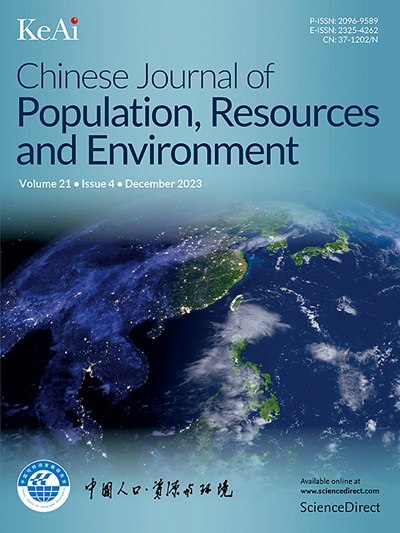Analysis of the process and outcomes of the first Global Stocktake under the Paris Agreement
IF 4.8
4区 环境科学与生态学
Q2 ENVIRONMENTAL STUDIES
Chinese Journal of Population Resources and Environment
Pub Date : 2025-06-01
DOI:10.1016/j.cjpre.2025.05.001
引用次数: 0
Abstract
Global Stocktake is an important component of the global climate governance mechanism. The first Global Stocktake under the Paris Agreement in 2023 has clarified collective progress and identified the paths to bridge gaps, but its understanding in the academic and policy communities is not yet systematic and comprehensive. Therefore, this study adopts textual analysis, timeline analysis, and game theory methods to comprehensively analyze the process and outcomes of the first Global Stocktake. The study finds that: ① The first Global Stocktake underwent three stages, including scientific enhancement, technical dialogue, and political consensus, and took more than five years to reach the final outcome of the United Arab Emirates (UAE) Consensus in which the 1.5 °C temperature control target anchored in the scientific enhancement stage set the general tone for the stocktake. ② The first Global Stocktake focused on three specific areas—mitigation, adaptation, means of implementation and support—to fully realize the signaling effect. ③ The most prominent outcome of the stocktake is the new consensus on “transitioning away from all fossil fuels in energy systems”, which specifies the direction for countries to update their nationally determined contributions in 2025 and for the international community to conduct the second Global Stocktake in 2028. ④ The four groups of countries, namely, developed countries, emerging economies, hydrocarbon-exporting-oriented economies, and climate-vulnerable countries, have different interests and hold distinct core positions, which constrain each other but advance the global stocktake process as a whole. ⑤ The outcomes of the stocktake are comprehensive and systematic, with as many as 196 consensus items; however, the detailed targets for the three major focus areas are unclear and rigid, and need to be strengthened in the second global stocktake. The study suggests that, on the one hand, China needs to strengthen its policy research in the light of the outcomes of the first Global Stocktake and prepare for the submission of updated nationally determined contribution in 2025 for 2035, which should be consistent with the 1.5 °C temperature control target. On the other hand, China should continue to take advantage of the zero-carbon industry to lead global climate change action and expand national development right and international communication capacity.
分析《巴黎协定》第一次全球盘点的进程和成果
全球盘点是全球气候治理机制的重要组成部分。2023年根据《巴黎协定》进行的首次全球盘点明确了集体进展,并确定了弥合差距的途径,但学术界和政策界对其的理解尚不系统和全面。因此,本研究采用文本分析、时间线分析、博弈论等方法,对第一次全球盘点的过程和结果进行综合分析。研究发现:①第一次全球盘点经历了科学强化、技术对话和政治共识三个阶段,并花了五年多的时间达成了阿拉伯联合酋长国(UAE)共识的最终结果,其中在科学强化阶段锚定的1.5°C温度控制目标为盘点设定了总体基调。第一次《全球盘点》侧重于减缓、适应、实施手段和支持三个具体领域,以充分实现信号效应。③盘点最突出的成果是关于“能源系统中不再使用所有化石燃料”的新共识,它为各国在2025年更新其国家自主贡献以及国际社会在2028年进行第二次全球盘点指明了方向。④发达国家、新兴经济体、烃类出口导向型经济体和气候脆弱国家这四类国家利益不同,核心立场不同,相互制约,但整体上推动了全球盘点进程。⑤盘点结果全面、系统,共识项目多达196项;但三大重点领域的具体目标不明确、刚性不强,需要在第二次全球盘点中进一步加强。研究建议,一方面,中国需要根据第一次全球盘点的成果加强政策研究,并准备在2025年至2035年提交更新的国家自主贡献,这应该与1.5°C的温度控制目标相一致。另一方面,中国应继续利用零碳产业引领全球应对气候变化行动,扩大国家发展权和国际传播能力。
本文章由计算机程序翻译,如有差异,请以英文原文为准。
求助全文
约1分钟内获得全文
求助全文
来源期刊

Chinese Journal of Population Resources and Environment
ENVIRONMENTAL STUDIES-
CiteScore
4.30
自引率
1.10%
发文量
791
审稿时长
79 days
期刊介绍:
The Chinese Journal of Population, Resources and Environment (CJPRE) is a peer-reviewed international academic journal that publishes original research in the fields of economic, population, resource, and environment studies as they relate to sustainable development. The journal aims to address and evaluate theoretical frameworks, capability building initiatives, strategic goals, ethical values, empirical research, methodologies, and techniques in the field. CJPRE began publication in 1992 and is sponsored by the Chinese Society for Sustainable Development (CSSD), the Research Center for Sustainable Development of Shandong Province, the Administrative Center for China's Agenda 21 (ACCA21), and Shandong Normal University. The Chinese title of the journal was inscribed by the former Chinese leader, Mr. Deng Xiaoping. Initially focused on China's advances in sustainable development, CJPRE now also highlights global developments from both developed and developing countries.
 求助内容:
求助内容: 应助结果提醒方式:
应助结果提醒方式:


